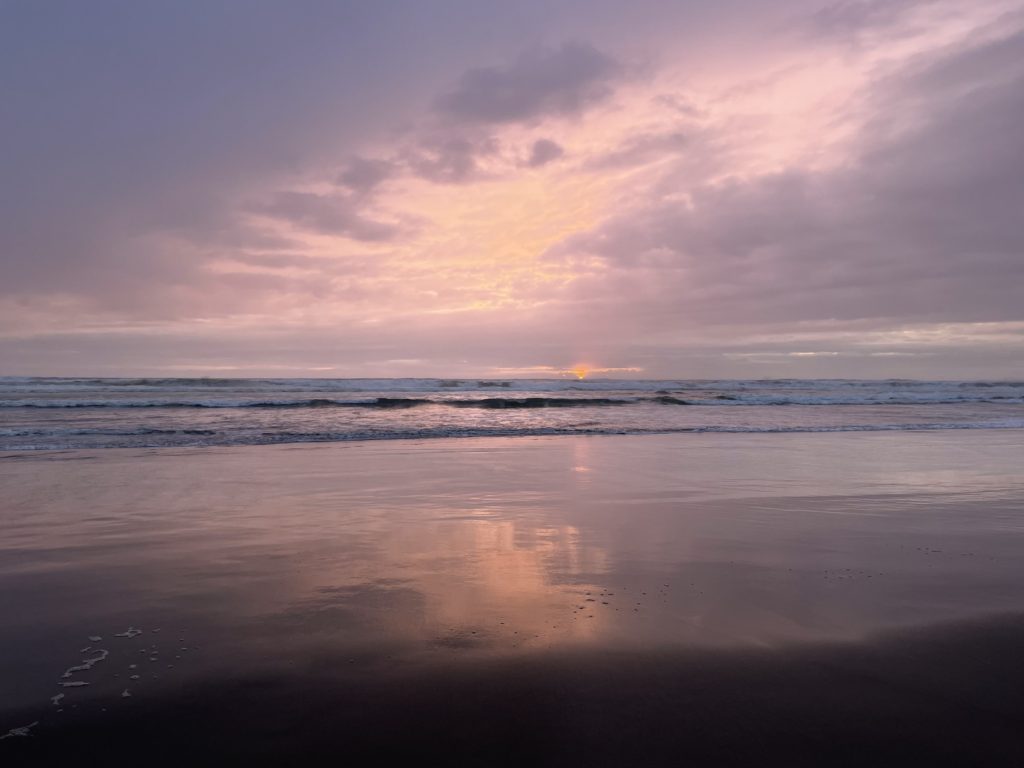
Dear friends,
I turned 64 a couple of weeks ago. Growing old has been on my mind a lot lately. It’s been damn stressful up in my brain. Here’s what’s helping me, offered to those of you who are also thinking about growing old and feeling stressed about it.
We were at the coast last week for our annual post-Easter rest. (My Episcopal priest husband naps. I walk.) As is often true of the Oregon coast in April, the weather was wet and windy. But every evening for a couple of hours, the rain would taper off and I’d drag Jed down to the beach to watch the sunset. On this particular evening, the sunset was subtle. A solid bank of clouds out over the ocean seemed set to block the sun’s rays as it sank into the sea. The cloudy sky turned a beautiful mauve and pink, mist gathered at the base of Mount Neahkahnie, and waves reflected the sky back to itself.
We passed a photographer with his tripod at the waves’ edge, long lens pointed to where the invisible sun might be. A family of five, their big black poodle bounding in the surf, walked up the beach toward Manzanita, occasionally glancing toward the western horizon. Jed and I were ready to go inside out of the wind ourselves, believing we’d seen all the show there was to see.
We were wrong. Suddenly the sun peeked out from a hole in the clouds and shone right at us. Immense. Orange. Stunningly beautiful—clouds above, below, and all around the one little hole. The sun had an entire limitless Pacific horizon to choose from, and she came down in the one place she could shine through. We were awestruck. Through binoculars we watched the curvature of the sun slowly sink behind the clouds like mountains. Words cannot describe.
I turned to see if the photographer was catching this, hopeful that he’d capture the shot of a lifetime. He was walking up the dunes, tripod over his shoulder, his back to the beauty blazing behind him. The family of five was likewise walking up the beach toward Manzanita, seemingly oblivious, black poodle still bounding in and out of the waves. We watched until the last burnished edge of sun sank below the cloud bank, and reminded each other to breath.
If we’d let the wind and the wet keep us inside, if we’d turned our backs too soon, if I hadn’t brought my binoculars … We would have missed it.
What does this moment have to do with growing old? Here’s my takeaway. If I expect my old age to be a long slide into mellowness and mist, if I turn my back too soon, I’ll miss many extraordinary moments. We see what we expect to see.
Show up. Get out on the beach, no matter what the weather.
Be present with each step and each breath. The future radiates out from the present like a wave.
The quality of your peaceful presence in this moment determines how your future will feel.
Your thoughts about aging—your thoughts about anything, really—will strongly impact your experience. You can choose different thoughts, if you want to and you do the work. (Learning to notice your thoughts and how to choose better ones is a core component of my coaching work.)
Expect the extraordinary.
Carry binoculars just in case.
Love,
Barb
PS. Some resources I’m finding helpful:
This episode of Glennon Doyle’s We Can Do Hard Things with anti-ageism activist Ashton Applewhite
This Chair Rocks: A Manifesto Against Ageism, by Ashton Applewhite
PPS. Interested in talking more about aging and how to think more helpful thoughts about this inevitable change? I offer free, no-strings-attached Clarity Calls.
PPPS. I share coaching availability and current events in my weekly email newsletter. Want to subscribe? Click here.
Photo: Manzanita Beach, Oregon. 2022.

